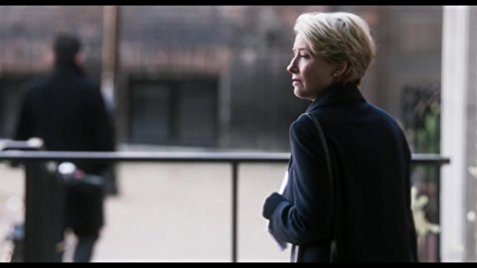The Children Act
Starring Emma Thompson, Stanley Tucci, Fionn Whitehead
Directed by Richard Eyre
Reviewed by Michael Dalton
[rating: 3/5]
There are performances, and then there are Performances. Its so often the case where you walk out of a film thinking how wonderful Meryl Streep or Sean Penn or Amy Adams are, but then you stop and find yourself wishing the movie had measured up to them. Consider Streep’s performance in The Devil Wears Prada. A turn and a half with every nuance and sigh so perfectly timed, you wish the film had been about more than just another tootsie working out her priorities. I found myself hoping, as I sat waiting patiently for Streep to reappear, that her charge, played with glassy-eyed abandon by Anne Hathaway, would sell her soul to the superficial fashion industry instead of thumbing her nose. It would’ve given the movie a kick, a surprise. Richard Eyre’s The Children Act, opening this week, is a similar case. It stars Emma Thompson as Fiona Maye, a family court judge who is presented with a case of, quite literally, life and death. A boy and his parents are refusing, on religious grounds (they’re Jehovah’s Witnesses), to allow a blood transfusion. The young man, Adam Henry (Fionn Whitehead), has leukemia and their biblical principles dictate that allowing another person’s blood into their bodies is sacrilege. One’s blood is handed directly from God and is not to be shared.
What marks out The Children’s Act aside from Thompson’s performance, one of startling precision, authority, dedication, and authenticity, is how it examines the power people like Maye not only have but must learn to live with and that dominates their lives. “This is a court of law, not a court of morals”, she declares early in the action while passing the judgement on a case involving cojoined twins. The backdrop to the film is her marriage to Jack (Stanley Tucci), one that is slowly crumbling due to her career devotion, but at the front of every scene is Thompson, juggling the demands of her profession. The surprise of the film, and it is a disappointing one, is that May hands her judgement down before the film is even halfway through (the trailer would have you believe otherwise) and there lays the problem. In McEwan’s novel, the remainder of the story works due to the ease and detail of his prose but here, bought to life handsomely by Eyre, it falls into melodrama that feels contrived and plays messily. The same thing happened when the over-praised Atonement (another McEwan novel) hit screens in 2007. The setup, the misconceptions, and the performances in the first act were sinister and feverish. We were tantalised by the possibilities (and the voyeuristic peeking of young Saoirse Ronan) but then it descended into a “heartbreaking wartime romance” only to be propped up by a film-stealing turn by Vanessa Redgrave. Sadly The Children Act doesn’t have a turn by Redgrave to close it out. What the film has is Thompson and it is due solely to her prowess that the mawkish second half holds up as well as it does. Her presence and raw emotion very nearly hold it together.




